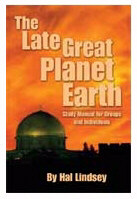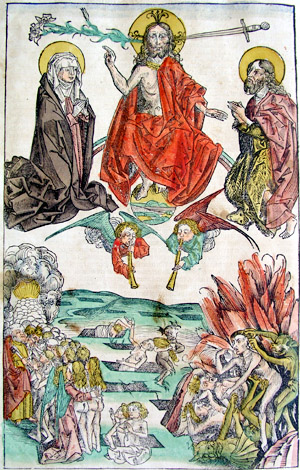 February 06
February 06
The Other Zionist Conspiracy: A History of Christian Zionism
by Valerie Saturen
p. 2 of 2

Contemporary Fervor and Republican Politics
The 1967 war and the Cold War created a climate in which Christian fundamentalists were particularly receptive to Scofield’s views on Revelations. In the 1970s, his “End Times Prophecy” found an enormous audience thanks to author Hal Lindsey, whose 1970 The Late Great Planet Earth was a New York Times bestseller that sold over 18 million copies in English and 20 million copies in 54 other languages. Lindsey views are clear. “The valley from Galilee to Eilat,” he once declared, “will flow with blood and 144,000 Jews will bow down before Jesus and be saved!” The rest of the Jews, according to Lindsey, are destined to perish in “the mother of all Holocausts.”
Lindsey’s novel has sold well throughout the last three decades and even enjoyed a spike in sales in August and September of 1990, as fears peaked over Iraq’s Hussein regime and, according to a CNN poll taken at the beginning of the Gulf War, 14% of Americans believed they were witnessing the beginning of Armageddon. Lindsey’s success also signified the creation of a popular genre, including the influential work of Timothy LaHaye and Jerry Jenkins, co-authors of the Left Behind series, in which Christian protagonists assassinate a former U.N. head who is revealed to be the Antichrist. The series has sold over 50 million copies.
The 1980s saw the election of Ronald Reagan, who had espoused Christian Zionist views in the past, and who enjoyed a close friendship with the evangelist Rev. Billy Graham. According to Reagan’s former legal secretary Herb Ellingwood, Reagan had developed a nearly obsessive fascination with apocalyptic prophecy, reading scores of apocalyptic novels. As governor, and later as president, Reagan became known for quoting Ezekiel, confiding to State Senate leader James Mills at one point that “everything is falling into place. It can’t be too long now. Ezekiel says that fire and brimstone will be rained down upon the enemies of God’s people. That must mean that they’ll be destroyed by nuclear weapons. They exist now, and they never did in the past.”
By the time of George W. Bush’s induction into the White House, approximately 40 million Americans expressed beliefs that fall within the scope of Christian fundamentalism, and that number increased dramatically following the attacks of September 11, 2001. Like Reagan, who often framed the struggle with Communism in language rife with religious overtones, George W. Bush has framed the War on Terror in a like manner, presenting the conflict in apocalyptic terms as “a monumental struggle between good and evil, [in which] good will prevail.” Along with frequent references to “evil” and “evildoers,” the President remarked in his September 20, 2001 speech before a Joint Session of Congress that “God is not neutral” in the War on Terror. Similar imagery has been echoed by evangelical leaders such as Falwell, who in 2002 infamously referred to the prophet Muhammad as a “terrorist” in a 60 Minutes appearance.
Evangelical Christianity and a steadfast belief in Biblical prophecy have been a driving force throughout the political career of George W. Bush himself, who in his late 30s became a born-again Christian and was formally converted by Rev. Billy Graham. Before announcing his candidacy, Bush met with Texas evangelist James Robison, confiding that he had given his life to Christ and felt that God wanted him to be President. According to Stephen Mansfield, author of The Faith of George W. Bush, he further revealed that he felt “something was going to happen” and the country would need his leadership during a time of crisis. Since assuming office, the President has been openly forthcoming with his religious convictions and the central role they occupy in his foreign policy decisions. According to veteran journalist Bob Woodward, Bush once declared that he would “export death and violence to the four corners of the earth in defense of this great country and rid the world of evil,” and he also allegedly told Palestinian Prime Minister Mahmoud Abbas that “God told me to strike al-Qaeda and I struck them, and then He instructed me to strike at Saddam, which I did.”
Christian Zionist ideology also remains a factor in the growing inclination toward American unilateralism. Among evangelicals, mistrust of the United Nations is often reinforced by religious leaders such as Pat Robertson, who wrote in his book The New World Order that the UN and the Council of Foreign Relations may be part of a “tightly knit cabal whose goal is nothing less than a new order for the human race under Lucifer and his followers.” The connection between unilateralism and evangelicalism, also a prominent feature of the Christian Right during the Cold War, stems from references in the Book of Revelations to a one-world governmental body (symbolized by a many-headed dragon) led by the Antichrist. In the face of a conflict of interests between Christian fundamentalists and the U.N. or E.U., the latter organizations have sometimes become the biblical “many-headed dragon” haunting the imagination of the Christian Right. The theme of the U.N. or E.U. as an implement of the Antichrist has been reinforced in apocalyptic literature from Lindsey to Robertson, highlighting a climate of American unilateralism and mistrust.
The Fine Line Between Philo- and Anti-Semitism
One of the particularly troubling aspects of Christian Zionism is the existence of explicit antisemitism within the movement. While most Christian Zionists are not overtly antisemitic, and while many feel genuine sympathy toward the Jewish people, there exists an undeniable undercurrent of anti-Jewish sentiment within the Christian Right. At its core level, the Christian Zionist ideology has Jews play a sacrificial role in the redemption of the Christian world, whether they like it or not. Additionally, some of the movement’s most influential leaders have issued remarks that reveal a far less friendly picture of evangelical Christian attitudes toward the Jewish people on whose behalf they claim to fight.

The most recurrent anti-Jewish sentiments among members of the Christian Zionist movement reflect deeply rooted Christian stereotypes that date back centuries, pertaining to the refusal of Jews to accept Christ, myths of Jewish greediness and money-savvy, and fears of Jewish conspiracies toward world domination. In fundamentalist Christian sermons, Jews are often referred to as “spiritually deaf” or “spiritually blind,” and their status among the “unsaved” is an integral part of evangelistic belief. Rev. Dan C. Fore, former head of the Moral Majority in New York, once professed, “I love the Jewish people deeply. God has given them talents He has not given others. They are His chosen people. Jews have a God-given ability to make money. They control the media; they control this city.” The sentiment has been echoed by Falwell, who remarked during one sermon that “a few of you don’t like the Jews, and I know why. They can make more money accidentally than you can on purpose.” Others, such as Rev. Donald Wildman, founder of the American Family Association, have adopted the view of evangelical leader R.J. Rushdoony’s conviction that the mainstream television networks promote anti-Christian values because they are mostly controlled by Jews.
At the same time as these dark undertones exist beneath the surface, Christian Zionists are -- on that surface -- very generous in their temporal (and perhaps temporary) support of Israel. They support the Nefesh b'Nefesh program, which subsidizes the costs of immigration to Israel. They support Israel in its struggles with the Palestinians and others. And they are increasingly coming to Israel, in greater and greater numbers. The Likud candidate for Prime Minister, Benjamin Netanyahu, has made a point of cultivating support among Christian Zionists, both to help him politically and to invest in Israel; he recently disclosed conversations to build a network of large, high-end hotels for Evangelical visitors, and a DVD interview with him is being sold on Hal Lindsey's website, which, like most Christian Zionist sites, assumes a pro-Israeli-Right political stance. Other Israeli politicians, and leaders of the Jewish Agency, are aware of the ulterior motives the Christian Zionists have for bringing Jews to Israel, but then again, since Jews don't believe in the prophecies anyway, they seem to feel that they have nothing to lose. Let the Evangelicals be disappointed when the Rapture doesn't happen; in the meantime, they are steadfast political and financial supporters of Israel. Whether this turns out to be a marriage of convenience or a "pact with the devil," of course, remains to be seen.
On the American side, the instrumental role formed by the Christian Right in U.S. foreign policy is rarely treated with the level of acknowledgement and importance it clearly warrants. In fact, the Christian Zionist movement has had a formidable impact upon American involvement in the Middle East. Christian Zionism, which is woven deeply into the fabric of American religious and political life, constitutes a rapidly growing movement that is certain to continue to exercise the considerable influence it exerts today. The movement’s ideology contains profound implications, and they must be examined closely, for the future of Christian Zionism may have profound consequences for the future of the world.
Valerie Saturen is a graduate student at the University of Arizona, where she studies the Near East.








